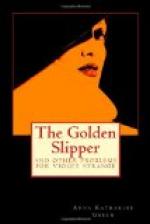“I was so sure of this that one night while I was winding up the clocks with which Mrs. Postlethwaite in her fondness for old timepieces has filled the house, I stopped to look at the little figure toiling so wearily upstairs, to bed, without a mother’s kiss. There was an appeal in the small wistful face which smote my hard old heart, and possibly a tear welled up in my own eye when I turned back to my duty.”
“Was that why I felt the hand of Providence upon me, when in my halt before the one clock to which any superstitious interest was attached—the great one at the foot of the stairs—I saw that it had stopped and at the one minute of all minutes in our wretched lives: Four minutes past two? The hour, the minute in which Frank Postlethwaite had gasped his last under the pressure of his wife’s hand! I knew it—the exact minute I mean—because Providence meant that I should know it. There had been a clock on the mantelpiece of the hotel room where he and his brother had died and I had seen her glance steal towards it at the instant she withdrew her palm from her husband’s lips. The stare of that dial and the position of its hands had lived still in my mind as I believed it did in hers.
“Four minutes past two! How came our old timepiece here to stop at that exact moment on a day when Duty was making its last demand upon me to remember Frank’s unhappy child? There was no one to answer; but as I looked and looked, I felt the impulse of the moment strengthen into purpose to leave those hands undisturbed in their silent accusation. She might see, and, moved by the coincidence, tremble at her treatment of Helena.
“But if this happened—if she saw and trembled—she gave no sign. The works were started up by some other hand, and the incident passed. But it left me with an idea. That clock soon had a way of stopping and always at that one instant of time. She was forced at length to notice it, and I remember, an occasion when she stood stock-still with her eyes on those hands, and failed to find the banister with her hand, though she groped for it in her frantic need for support.
“But no command came from her to remove the worn-out piece, and soon its tricks, and every lesser thing, were forgotten in the crushing calamity which befell us in the sickness and death of little Richard.




